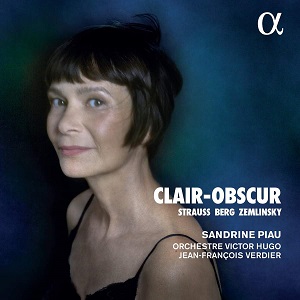The premise for this new issue from Alpha is supposedly the tension between light and dark, suggested in the French term ‘clair-obscur’, and explored through orchestral songs inclined towards a plush late-Romanticism. More pertinent, perhaps, is the disc’s connective thread encompassing times of the day (dawn and dusk) and moments in one’s life. Sandrine Piau suggests that her interest, more of an obsession, with the contrast between ‘black and white, immobility and movement’, is derived from ‘the richness of music, which, draped in mystery, creates matchless unions’. There’s certainly no lack of opulence in the sumptuous harmonies and poetic mystery encased in these settings by Richard Strauss, Berg and Zemlinsky – three composers not often linked with this French soprano who has long been associated with Baroque figures, as her distinguished discography reveals.
Yet this collection allows Piau to venture into repertoire she apparently loved as a student. She’s been widening her musical horizons for some years now and incorporated songs from Chausson to Zemlinsky in her recordings for Naïve. Her versatility is not in question, but a handful of critics have pointed to her limitedpalette. Nevertheless, Piau deploys her clean, true soprano with commendable accuracy and undeniable musicianship. It’s a supple instrument and one that negotiates the angularities of Berg’s Sieben frühe Lieder with an easy assurance. If she lacks a range of colour needed for these songs, then the absence of vibrato and her immaculate sense of line is very welcome.

Within the seven songs (completed in 1908 and orchestrated in 1928), I love the sense of veiled wonder Piau brings to the exoticism of ‘Nacht’. At the first climax her voice blossoms to point up the magical vision implicit in Carl Hauptmann’s text where ‘Lights twinkle in the silent night’. Cameo contributions from solo violin, clarinet and flute are well projected, and the song’s mystery is beautifully communicated. There’s tenderness in the sighing phrases of ‘Schliflied’ and her limpid tones soar across ‘Die Nachtigall’. Ifitsfervour is controlled, a heady sensuousness permeates the dream-like recollections of ‘Traumgekrönt’ where Piau caresses each phrase and spins out her final note with melting warmth, celesta sprinkling fairy dust in the last bars. ‘Im Zimmer’ flows comfortably, but its domestic cosiness feels too pallid for this blissful moonlit union, and the darker ‘ecstatic dreams’ of ‘Liebesode’ need a little more vocal weight; rapture rarely spills over into unbridled passion. She sweeps through‘Sommertage’ persuasively and traverses its sinuous contours with a vigour that captures the poet’s awe of nature’s beauty. Throughout, she balances well with the players of the Victor Hugo Franche-Comté Orchestra who give unequivocal support and generate some exquisite colouring in the varied scoring, with full orchestra only used in the outer movements.
Alexander von Zemlinsky employs just strings, harp and two horns for his seldom-recorded scena that is Waldgespräch; a fin de siècle ballad conceived for the Viennese ensemble Polyhymnia in which Arnold Schoenberg played the cello. In setting Eichendorff’s tale of the legendary Lorelei who lures men to their deaths, Zemlinsky evokes a graphic encounter between protagonist and seducer. Galloping horses, a huntsman and a forbidding castle contribute to the work’s unsettling beauty, vividly captured by Piau who brings all her dramatic intensity to bear.
Her singing is no less emotionally charged in the music of Richard Strauss, whose life encompassed the first production of Wagner’s Tristan und Isolde and Britten’s Peter Grimes. While he lived through Schoenberg’s atonal revolution and the emergence of serialism, Strauss was regarded as one of the last great German Romantics, no more apparent than in the blissful serenity of ‘Morgen’ of 1894. Everything here is wonderfully composed, a perfect collaboration between voice and ensemble launched by beguiling solo violin and harp and later mellow horns. Piau combines tenderness and vulnerability in a voice suggestive of bridal innocence, ideal for a song written as a wedding gift for the composer’s singer wife Pauline de Ahna. ‘Meinem Kinde’ was prompted by the eminent arrival of her one and only child and is sung here with much affection; so too the gentle, posthumously published ‘Malven’ that closes this disc.
Strauss’ Vier letzte Lieder of 1948 (texts by Hermann Hesse and Joseph Eichendorff) look back contentedly on a lifetime’s companionship in the autumn of his life. Originally designed for the great Wagnerian Kirsten Flagstad, the songs are written with remarkable sympathy and imagination and have become a staging post for every aspiring soprano. But within a crowded market of vintage recordings, can there be room for another interpretation? On the strength of this luminous version, I would give an unreserved ‘yes’. Conductor Jean-François Verdier guides the orchestra through a direct, unaffected and well-balanced reading, so that Piau’s fresh, silvery tone never struggles to project. She comfortably soars above the orchestra in ‘Frühling’ and dispatches the searching lines of ‘September’ with ease, her last phrase a miracle of breath control, horn solo matching her eloquence. ‘Beim Schlafengehen’ (with shapely solo violin) is suitably languorous, yet not so indulgent as to withhold the soul’s release into the slumber of ‘night’s magic circle’. Meanwhile, the faster than usual tempo of ‘Im Abendrot’ still holds its sunset glow and its deceleration is well-judged. Overall, this is a forward-moving account that leans towards a sugar-free interpretation where no lilies are knowingly gilded in the making. My only caveat is the disc’s parsimonious fifty-minute duration (a feature of Piau’s last two discs with Alpha), but at least one is left wanting more.
David Truslove
Sandrine Piau (soprano), Jean-François Verdier (conductor), Orchestre Victor Hugo Franche-Comté
Berg – Sieben frühe Lieder; Strauss – ‘Morgen’, ‘Mienem, Kinde’, ‘Malven’, Vier letzte Lieder; Zemlinsky – Waldgespräch
Alpha (Alpha Classics) 727 [50.44]
ABOVE: Sandrine Piau © Sandrine Expilly